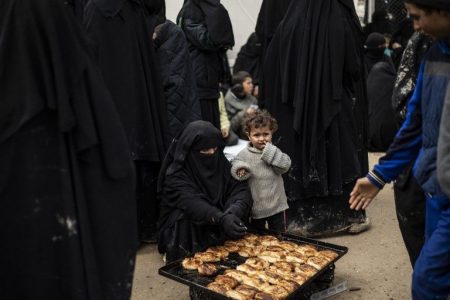
Women prisoners linked to Islamic State terrorist group released from the al-Hol camp
The Kurdish-led Syrian Democratic Forces (SDF) have released a seventh batch of women formerly affiliated with the Islamic State (IS) from al-Hol camp after years of detention. This release further carries out a November 2020 decision issued by the autonomous administration of northeast Syria to empty al-Hol camp of Syrian families.
Those released the evening of July 22 included 82 families (229 women and children). Most were under detention for familial links to IS fighters who were killed or are in SDF prisons.
One woman who was released, Khadija al-Ahmad, also known as Om al-Mughira, told Al-Monitor she was relieved to have gotten out of the camp with her three children. “Life there is complicated, especially in terms of health issues; there’s no real health care. In addition to the poor security situation, we were threatened by Islamic State cells in the camp that said we must reveal any contact with the Syrian Democratic Forces that controlled and managed the camp.”
The 36-year-old woman, who had been detained in al-Hol since February 2019, said, “We had to go to the SDF administration offices to register to get out of the camp, but IS cells considered that to be dealing with the enemy. As a result, dozens of threats were made, involving assassination and murder in many cases.”
Khalid Mouss, the chairman of the Relations Committee of the Raqqa Civil Council, the civilian authority in Raqqa, said the committee has been suggesting which women should be released. He said the suggestions “are made at the request of clan representatives in the region who provided guarantees about the women who want to leave the camp. A vetting process takes place for every person who wants to leave before they can go.”
Mouss said the mechanism for women to leave the camp is guided by priorities established by the autonomous administration, which include trying to first release women and children from Raqqa.
A former officer in charge of the file for the exit of families from al-Hol camp, Jalal al-Ayyaf of Raqqa, denied that there is such a priority. “I was in that position to help our people and solve their problems, but when we saw that there was no response to our demands as representatives of the region’s clans, I preferred to leave it to someone else. It was better than doing the wrong thing.”
Ayyaf said that of the 82 families released July 22, there were only two families from Raqqa; the rest of the families headed by women from areas controlled by the Syrian regime.
Jalal said the lead grouping for the women’s release is not the Council Relations Committee but rather the Camp Management Office, which reports directly to the SDF. He said the committee only receives women the Camp Management Office decided to release and that the camp officials’ rationale for their actions is not shared with local offices in the areas under SDF control in northeastern Syria.
He said, “Less than 1% of the names we proposed as clan representatives had been released.” He said that even though he has resigned from his post, he still receives endless questions from the women’s families every day.
Amina, a displaced woman based in Tabqa city in Raqqa’s western countryside, said her 26-year-old daughter, who had married an IS Moroccan fighter, has been detained with her 4-year-old daughter in al-Hol for three years.
Amina, who asked that her last name not be used in order to protect her family, said she been trying to find a way to way to get her daughter and grandchild out of al-Hol without success. “At first, I asked the Civil Council many times, and they told me to go to al-Hol camp. Despite the difficulty of the road, I went there and met the camp officials, but without any results; they didn’t release her or her daughter.”
She speaks in shock about the significant trauma she suffered when she saw her daughter in al-Hol for the first time. “My daughter told me about a disaster that had befallen her. My 4-year-old granddaughter was raped inside the camp, and that meant taking her to the medical area there for several days; even though we knew who did this and filed a formal complaint, the SDF took no action against him.” Amina did not want to provide further details as she was afraid this would cause more problems for her daughter and granddaughter.
Amina said she has taken various approaches to try to get her daughter released. “I tried to ask the clan representers for help to get them out, but that was difficult because we were displaced and did not belong to a known clan here.
“On my last visit, I met some dignitaries and explained the case to them, but they apologized because they couldn’t help me. And when I left, one of them followed me out and asked, ‘How much can you pay me to get your daughter out?’ But I don’t have money to eat tomorrow, so how can I pay him?”
Elham Ahmed, the joint president of the Syrian Democratic Council, said in November 2020 at a meeting held at the Raqqa Civil Council that it was going to empty al-Hol camp of Syrians and their children because the autonomous administration could no longer afford this “heavy load.”
Source: Al Monitor





